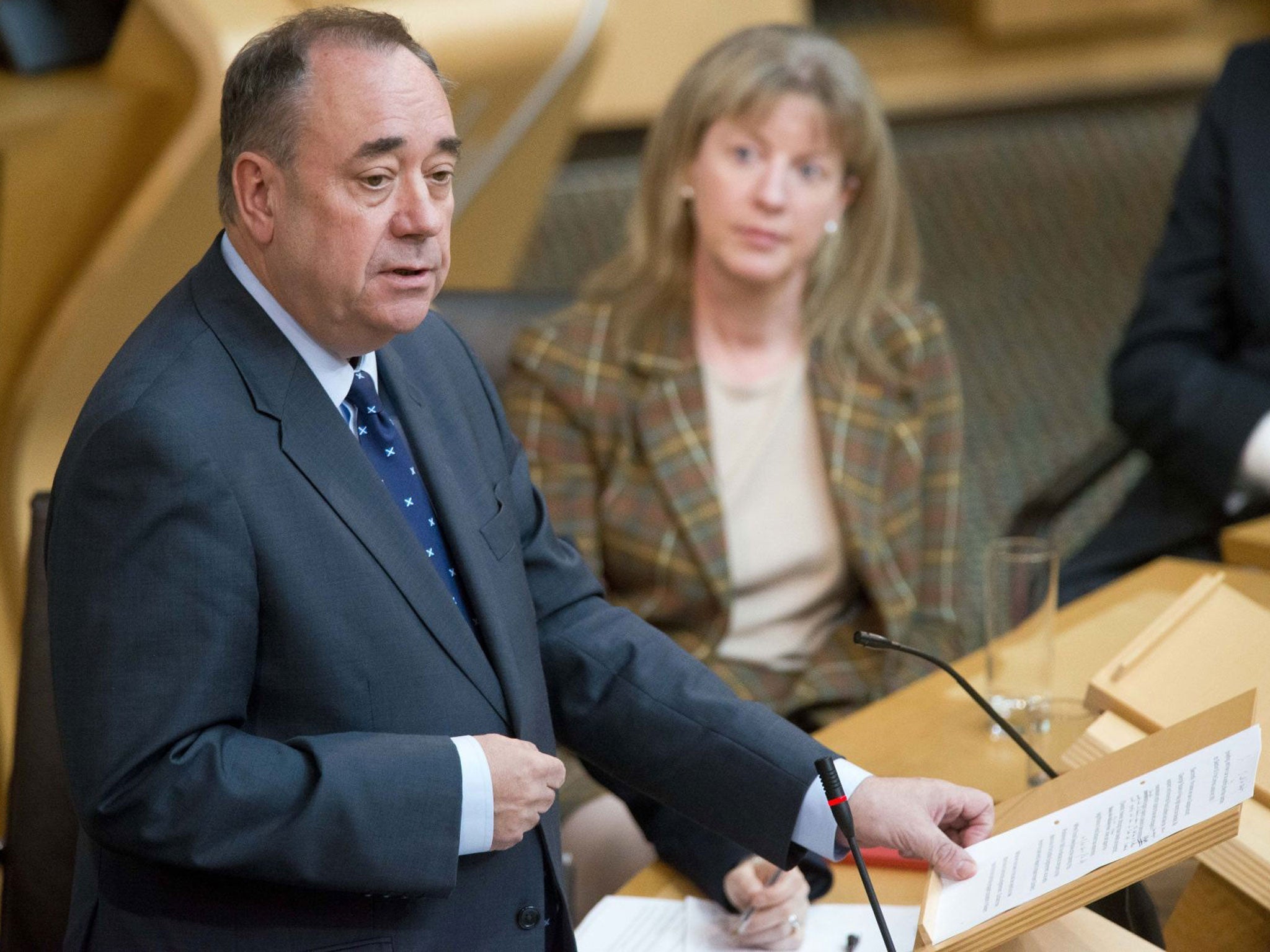Scottish independence: SNP doubles in size as thousands of Scots flock to join
Alex Salmond makes first speech to Scottish Parliament since referendum

The independence referendum was the “greatest democratic experience in Scotland’s history” and the country has emerged as “a better nation” because of it, Alex Salmond has said.
In his first speech to the Scottish Parliament since the people of Scotland voted to remain part of the UK last week, the First Minister thanked voters on both sides of the debate for participating in record numbers, hailing the 84.5 per cent turnout as evidence that the country was “more informed, more enabled and more empowered” than ever before.
Despite the referendum result, Mr Salmond had reason to be cheerful as it emerged that since the polls closed on Thursday night, parties associated with the Yes campaign have experienced huge surges in membership.
The SNP, of which Mr Salmond is the outgoing leader, is on the verge of doubling in size since the vote, and claimed to have overtaken the Lib Dems, becoming the UK’s third largest political force after Labour and the Conservatives.
It said it had signed up 24,000 new members since 5pm on Thursday, bringing its total number of supporters to more than 50,000. The last confirmed UK-wide Lib Dems’ membership number was 43,451 at the start of 2014. The Scottish Greens, who were also in favour of independence, have signed up 3,700 new members since the polls closed, more than doubling in size since Thursday.
Julia Sutherland, a comedian who was in favour of a Yes vote, said she had joined the Scottish Greens in the past few days out of a “sense of helplessness” at the result. “We were trying to affect change for the future of Scotland and because we weren’t able to do that, because we didn’t get the vote we wanted, this is what we do now because we feel part of a movement, we feel forever changed,” she said. “We feel we’re engaged in a way that we weren’t before.”
In his speech, Mr Salmond also declared that the case for allowing 16 and 17-year-olds to vote in all UK elections was now “overwhelming and unanswerable” given their successful participation in the referendum. According to a small-scale, snap poll commissioned by Tory peer Lord Ashcroft after the vote, 71 per cent of the cohort voted in favour of independence.
“There is not a shred of evidence for arguing now 16 and 17-year-olds should not be allowed to vote. Their engagement in this debate, this great constitutional debate, was second to none,” Mr Salmond said, telling MSPs they had proved themselves to be “serious, passionate and committed” citizens.
Before the First Minister spoke, the Parliament’s presiding officer Tricia Marwick described the referendum as “an extraordinary expression of civic democracy” which had energised people who usually had no interest in politics, forcing them to get “off their settees” and “into polling stations”.
During a special five-minute speech in the “time for reflection” slot usually reserved for matters of faith, she said: “I have been truly humbled by the clear wish of so many of our fellow Scots to be involved, many for the first time. How often have we heard people say they were not going to bother voting because it wouldn’t make any difference?”
Mr Salmond also told MSPs that the promises of more powers for the Scottish Parliament given at the 11th hour by David Cameron, Nick Clegg and Ed Miliband must be honoured, calling for the three party leaders to have “their feet held to the fire” to ensure more devolution north of the border.
Lord Smith, the peer charged with building a consensus around the new powers, said during a visit to the Scottish Parliament that the process would “not be easy” and would require cooperation from all of the political parties involved.
His Scotland Devolution Commission is to hold cross-party talks with the aim of producing a series of recommendations by 30 November to deliver more financial, welfare and taxation powers to the Scottish Parliament. His work will be informed by a UK Government command paper due to be published by the end of October.
Lord Smith said: “My message today to the political parties is a simple one: Scotland expects you to now come together, work together and agree the detail of what those powers should be. Time is tight but this is not an exercise in thinking about what we could do; that has been done. It is about agreeing on what we will do.”
Subscribe to Independent Premium to bookmark this article
Want to bookmark your favourite articles and stories to read or reference later? Start your Independent Premium subscription today.

Join our commenting forum
Join thought-provoking conversations, follow other Independent readers and see their replies